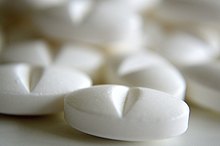Ibuprofen and Fluid Retention
Ibuprofen relieves pain and reduces fever, but it can also sometimes cause or aggravate fluid retention. According to a March 2002 article in the "American Journal of Cardiology," fluid retention occurs in approximately 2 percent to 5 percent of people who take nonsteroidal antiinflammatory drugs -- the medication group that includes ibuprofen. Although noticeable fluid retention is unlikely in young, healthy adults who occasionally use ibuprofen, it might occur after long-term, regular use of the medication. More commonly, ibuprofen aggravates existing fluid retention in people with heart and/or kidney disease.
Newly Developed Fluid Retention
Ibuprofen (Advil, Motrin) sometimes causes newly developed fluid retention. This occurs primarily because the kidneys tend to retain extra salt and water under the influence of ibuprofen -- although noticeable fluid retention is uncommon and the risk differs among people. Young people in good health who occasionally take ibuprofen for minor pain or an illness rarely develop symptoms of fluid retention, such as eye or finger puffiness, swelling of feet and ankles, or weight gain. However, people with heart, liver or kidney disease and those with high blood pressure are more likely to develop fluid-retention symptoms.
- Ibuprofen (Advil, Motrin) sometimes causes newly developed fluid retention.
- Young people in good health who occasionally take ibuprofen for minor pain or an illness rarely develop symptoms of fluid retention, such as eye or finger puffiness, swelling of feet and ankles, or weight gain.
Increased Fluid Retention
Information About Soft Gel Ibuprofen
Learn More
Ibuprofen may worsen existing fluid retention -- also known as edema -- that often accompanies conditions such as cirrhosis of the liver, heart failure and chronic kidney disease 3. In some cases, this causes an increase in typical fluid retention symptoms. If the edema becomes severe, however, symptoms such as:
- shortness of breath
- coughing
- extreme tiredness
- loss of appetite
- nausea can develop along with a sudden increase in body weight
People who take medications that control these diseases are especially vulnerable to fluid retention from ibuprofen. For example, water pills taken to reduce edema or lower blood pressure are sometimes less effective if taken with ibuprofen.
- Ibuprofen may worsen existing fluid retention -- also known as edema -- that often accompanies conditions such as cirrhosis of the liver, heart failure and chronic kidney disease 3.
- If the edema becomes severe, however, symptoms such as: * shortness of breath
* coughing
* extreme tiredness
* loss of appetite
* nausea can develop along with a sudden increase in body weight People who take medications that control these diseases are especially vulnerable to fluid retention from ibuprofen.
Long-Term Effects
Daily use of ibuprofen for many years might cause serious kidney damage with associated fluid retention. However, this complication is uncommon and does not occur other than with long-term use. The risk of kidney damage appears to increase with the number of years the drug has been used. Higher dosages also appear to increase the risk of long-term kidney damage. This condition most often occurs in women over 50.
- Daily use of ibuprofen for many years might cause serious kidney damage with associated fluid retention.
- However, this complication is uncommon and does not occur other than with long-term use.
Warnings and Precautions
What Are the Dangers of Taking Excedrin Every Day?
Learn More
Talk with your doctor if you notice unusual weight gain or other symptoms of fluid retention after taking ibuprofen. In most cases, these symptoms go away within a few days after you stop taking the medication. Talk with your doctor or pharmacist before taking ibuprofen if you have high blood pressure, are over 65, or have liver, kidney or heart disease. Professional medical societies, such as American Society of Nephrology and American Geriatrics Society, recommend avoiding use of ibuprofen if possible if you are at increased risk for fluid retention or other side effects associated with the drug.
- Talk with your doctor if you notice unusual weight gain or other symptoms of fluid retention after taking ibuprofen.
- Professional medical societies, such as American Society of Nephrology and American Geriatrics Society, recommend avoiding use of ibuprofen if possible if you are at increased risk for fluid retention or other side effects associated with the drug.
Related Articles
References
- American Journal of Cardiology: Effects of Nonsteroidal Anti-Inflammatory Drug Therapy on Blood Pressure and Peripheral Edema
- American Heart Association: Warning Signs of Heart Failure
- National Kidney Foundation: About Chronic Kidney Disease
- American Family Physician: Treatment of Edema
- Pharmaceuticals: Nonsteroidal Anti-Inflammatory Drugs and the Kidney
- BMJ: Concurrent Use of Diuretics, Angiotensin Converting Enzyme Inhibitors, and Angiotensin Receptor Blockers With Non-Steroidal Anti-Inflammatory Drugs and Risk of Acute Kidney Injury: Nested Case-Control Study
- U.S. Food and Drug Administration: Ibuprofen Drug Facts Label
- Clinical Journal of the American Society of Nephrology: Critical and Honest Conversations: The Evidence Behind the “Choosing Wisely” Campaign Recommendations by the American Society of Nephrology
- Journal of the American Geriatrics Society: American Geriatrics Society Updated Beers Criteria for Potentially Inappropriate Medication Use in Older Adults
- Ngo VTH, Bajaj T. Ibuprofen. In: StatPearls. Updated May 30, 2020.
- Bello AE. DUEXIS (ibuprofen 800 mg, famotidine 26.6 mg): A new approach to gastroprotection for patients with chronic pain and inflammation who require treatment with a nonsteroidal anti-inflammatory drug. Ther Adv Musculoskelet Dis. 2012;4(5):327-39. doi:10.1177/1759720X12444710
- Sostres C, Gargallo CJ, Lanas A. Nonsteroidal anti-inflammatory drugs and upper and lower gastrointestinal mucosal damage. Arthritis Res Ther. 2013;15 Suppl 3:S3. doi:10.1186/ar4175
- Strate LL, Singh P, Boylan MR, Piawah S, Cao Y, Chan AT. A prospective study of alcohol consumption and smoking and the risk of major gastrointestinal bleeding in men. PLoS ONE. 2016;11(11):e0165278. doi:10.1371/journal.pone.0165278
- U.S. Food and Drug Administration. Ibuprofen drug facts label. Updated April 6, 2016.
- Patel V, Sanyal AJ. Drug-induced steatohepatitis. Clin Liver Dis. 2013;17(4):533-46, vii. doi:10.1016/j.cld.2013.07.012
- Ding WX, Yang L. Alcohol and drug-induced liver injury: Metabolism, mechanisms, pathogenesis and potential therapies. Liver Res. 2019;3(3-4):129-31. doi:10.1016/j.livres.2019.11.006
- Lipman GS, Shea K, Christensen M, et al. Ibuprofen versus placebo effect on acute kidney injury in ultramarathons: a randomised controlled trial. Emerg Med J. 2017;34(10):637-42. doi10.1136/emermed-2016-206353
- Goyal A, Daneshpajouhnejad P, Hashmi MF, Bashir K. Acute kidney injury (acute renal failure). Updated June 22, 2020.
- Fan Z, Yun J, Yu S, Yang Q, Song L. Alcohol consumption can be a "double-edged sword" for chronic kidney disease patients. Med Sci Monit. 2019;25:7059-72. doi:10.12659/MSM.916121
- Auriel E, Regev K, Korczyn AD. Nonsteroidal anti-inflammatory drugs exposure and the central nervous system. Handb Clin Neurol. 2014;119:577-84. doi:10.1016/B978-0-7020-4086-3.00038-2
Resources
Writer Bio
Anna Boyum is an award-winning scientist with a Ph.D. degree in medicine. Dr. Boyum spent a decade developing medical technology, which is now patented and used in research laboratories and clinics around the world. Today, Dr. Boyum writes about science and medicine and teaches college science classes.









